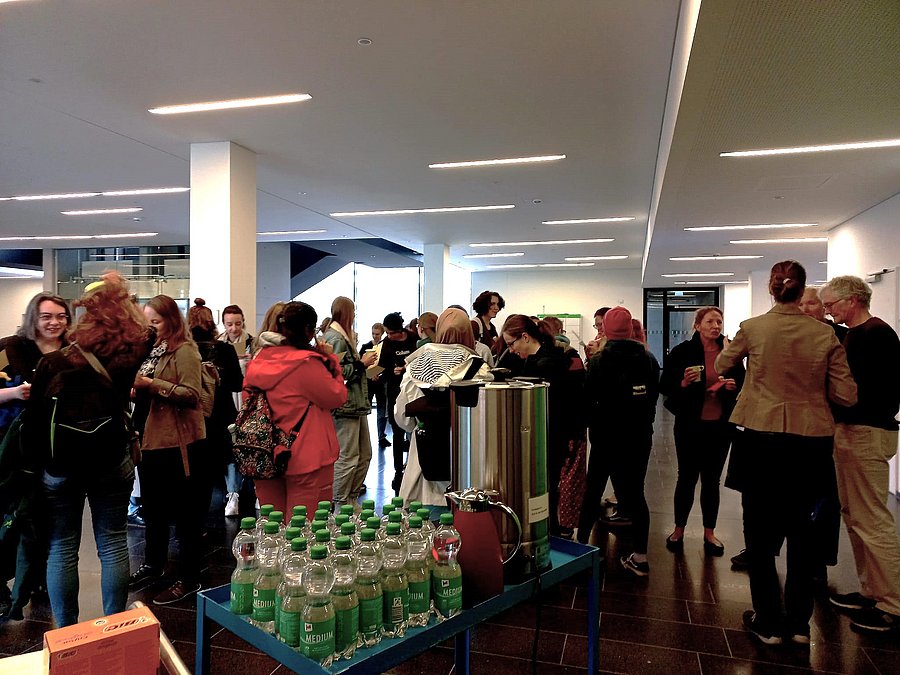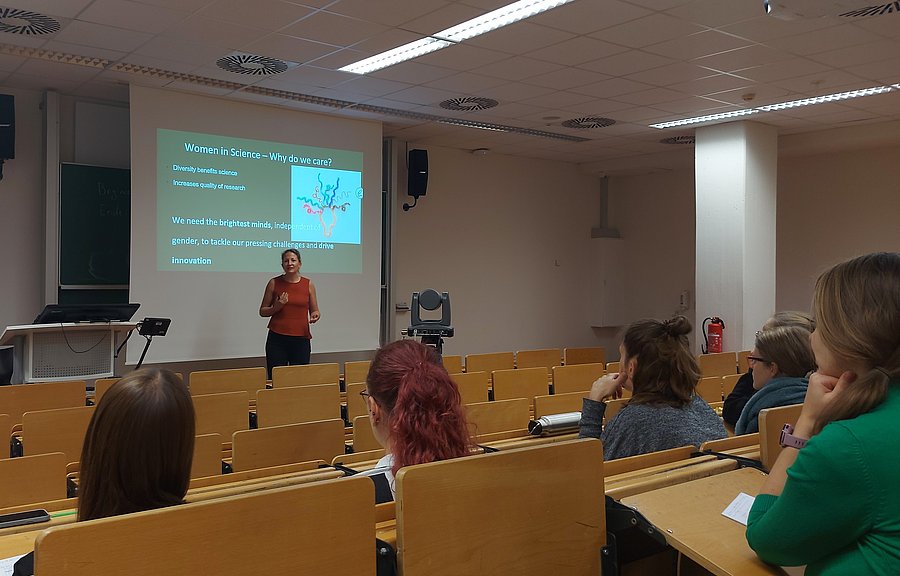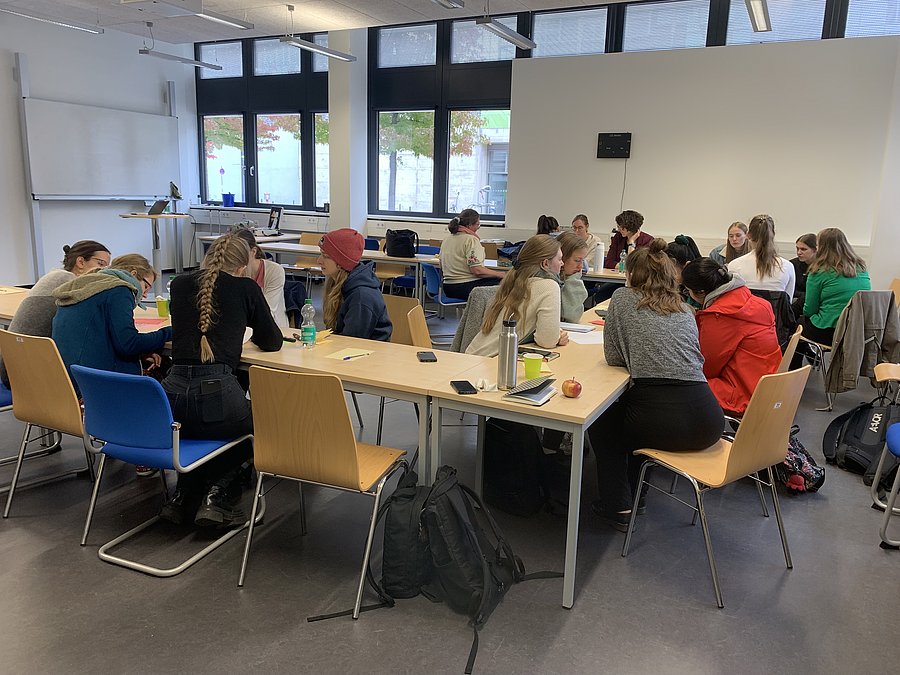Equality
Women in science: A day characterised by potential

Making contacts, building a network and learning from female role models - supporting women in science were some of the goals at the premiere of "Unlock your Potential". // Photo Marie Moosburger
From Master's students to postdocs - "Unlock your Potential" invited women who aspire to a career in science. The organisers from the school of mathematics and natural sciences - a team of decentralised equal opportunities officers and representatives from the Dean's Office - created a day programme with inspiring keynote speeches, space for networking, workshops and information blocks on various funding programmes and ways of acquiring third-party funding for their own research, among other things. The aim: to support women wherever possible so that they can successfully shape their path in science.
"The great interest and the very encouraging initial feedback show us that we are meeting a real need with this format. That's why we are definitely planning to continue. The feedback from the participants during the conference has already given us valuable insights into which topics are of particular interest to them. We are now considering how we can address and communicate these even more specifically in future. So we can look forward to it," sums up deanery officer and co-organiser Dr Isabella Kappner.
To kick off the day, junior professor Kira Tiedge used her own CV as an example to motivate the participants that this path does not have to end after the doctorate. She herself studied biology in Wuppertal and has now moved to Groningen in the Netherlands, where she heads her own research group as a junior professor.
Her presentation went far beyond a personal introduction. She combined studies on the current situation of women in science with a plea for systematic support for female scientists. "I thought for a long time that we just needed more time and then more women would make it. But little has changed and we can't wait any longer," said Tiedge.

Kira Tiedge as a guest at her former place of study: The former student of the university of Wuppertal is now a junior-professor in the Netherlands. // Photo Marylen Reschop
Finding your own mix
Women are in the majority in science up to doctoral level, before they are overtaken by their male colleagues in the post-doctoral phase. After that, the gap widens even further. In Germany, the proportion of women in full-time professorships was 29 per cent at the end of 2023. There are many reasons why significantly fewer women than men work in science: poor work-life balance, few role models, prejudices, outdated role models and bullying pose particular challenges for women.
In her role as a role model, Tiedge gave a profound insight: "Realise that a CV is not just made up of successes. I first studied medicine, then biology with the aim of becoming a teacher, applied for honours and jobs that I didn't get and submitted publications that I put everything into, only to be rejected. It was difficult, but you still have to keep going." Compromises were also part of it, such as short nights or leaving an event earlier to sit down at the computer again in the evening. For herself, she has now realised that she doesn't want to strictly separate work and private life.
For example, she holds video meetings while travelling between two of her children's appointments. "But everyone has to find their own mix and see what feels healthy for them." In general, she encouraged her audience to learn from female role models what suits them best. "Everyone has something to learn from. There are different ways to be successful," said Tiedge.

Group work in the workshop // Photo Corinna Stärk
Tips and tricks for everyday life
Finally, she formulated further practical advice that the participants can implement directly, such as telling others about their own career plans: "This is the only way your environment can give you tips when they hear about funding programmes or exciting jobs." And she also wanted this tip to be understood: "Don't always be the one in the team who organises Christmas parties and birthday presents. This task is often assigned to women. It's worth saying no and using your capacities differently."
The importance of formats such as "Unlock your Potential" for young female scientists was also emphasised in this advice: "Have fun and network!" The women had numerous opportunities to do this throughout the day, for example during the coffee break at "Female Scientists Bingo". The game created a relaxed atmosphere in which to get to know each other and talk about curious things.
Help with hostility and reflecting on one's own abilities
The two workshops on offer, "Future Skills" and "Scicomm Support", focussed on helpful tools that women can use on their career path in science.
The German counselling service Scicomm-Support, for example, supports researchers who are affected by hostility and hate speech. In recent years, the tone and hostility towards scientists and scientific institutions - not only, but especially on social media - has become increasingly harsh. According to statistics, women are targeted more often than men - and they report forms of discrimination including harassment and stalking. Working together in groups, the participants discussed a case study and developed strategies for dealing with such situations. One of the key messages of the workshop was that the solution is not to remain silent in the future. Science communication is also increasingly being demanded by funding organisations and, in the best-case scenario, helps to provide the public with well-founded facts.
Future skills are the competencies - the knowledge, skills and attitudes - that are necessary to operate successfully in a rapidly changing and increasingly digitalised world and to actively help shape it. The participants not only received a theoretical introduction, but were also able to actively engage with the competences in order to discover how they are positioned in this regard.
Feedback from the participants
"The event strengthens the self-confidence of women in STEM subjects."
"I think the concept is important and useful; it provides a good basis for interdisciplinary dialogue."
"The realisation that I have developed not only professional but also personal skills while working in science was particularly informative and inspiring for me."
Helpful links for female students and researchers at the University of Wuppertal
Equal Opportunities School of Mathematics and Natural Sciences: fk4.uni-wuppertal.de/de/dekanat-und-organisation/gleichstellung/
Funding programmes: www.gleichstellung.uni-wuppertal.de/de/foerderprogramme-instrumente/wissenschaftliche-laufbahn-fuer-frauen/
Research applications: www.gleichstellung.uni-wuppertal.de/de/beratung-service/beratung-bei-forschungsantraegen/
Families office: www.familienbuero.uni-wuppertal.de/index.php?id=20881&L=0
Anti-discrimination: antidiskriminierung.uni-wuppertal.de/de/
